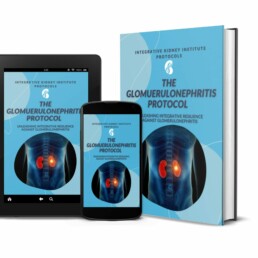We delve deeply into numerous medical journals to bring you the latest insights on Integrative Medicine’s impact on kidney health, recognizing the importance of your time. Our dedication to curating and concisely summarizing these essential studies continues unabated. Welcom to the January Research and News.
Optimal Timing for Chronic Kidney Disease Screening: A Cost-Effectiveness Perspective
This study conducted by Marika M. Cusick and colleagues assesses the cost-effectiveness of initiating chronic kidney disease (CKD) screening at various ages in conjunction with the use of sodium-glucose cotransporter-2 (SGLT2) inhibitors.
Utilizing a decision-analytic Markov model, the research explored the health outcomes and financial implications of starting CKD screenings at ages ranging from 35 to 75 years, performed every 5 to 10 years.
The findings revealed that starting screenings every 5 years from age 55, combined with SGLT2 inhibitors, provides a cost of $128,400 per quality-adjusted life year (QALY) gained.
Although earlier screenings at ages 35 or 45 yielded greater health benefits, the costs exceeded $200,000 per QALY, surpassing typical cost-effectiveness thresholds.
Why Is This Important?
This analysis is pivotal for health policy development, suggesting that initiating CKD screening at age 55 with subsequent screenings every 5 years is the most cost-effective strategy when paired with modern treatments like SGLT2 inhibitors.
These findings can help optimize healthcare resource allocation, ensuring that interventions not only enhance patient outcomes but also represent a financially viable strategy.
Medication-Induced Acute Kidney Injury: Insights from a Cross-National Drug-Wide Association Study
Alessandro Bosi and colleagues conducted an exploratory Drug-Wide Association Study (DWAS) to identify medications linked with increased risk of acute kidney injury (AKI) using data from Denmark and Sweden between 1997 and 2021.
The study employed a case-time control design, examining drug dispensing patterns before AKI hospitalization. Conditional logistic regression adjusted for comorbidities estimated the association between drug exposure and AKI risk.
Key findings identified 16 medications linked to AKI, validated through pharmacovigilance data and literature reviews, including known risk medications like furosemide and penicillin, and others requiring further study like opioids.
Why is this Important?
Understanding the link between drug use and AKI is crucial for enhancing patient safety and optimizing medication management. By pinpointing potential risk factors, healthcare providers can better anticipate and mitigate AKI risks, especially in vulnerable populations.
Cross-Generational Effects of Maternal Low-Level Exposure to Air Pollution on Kidney Health
A study led by Hui Chen and colleagues, published in the American Journal of Nephrology, investigated the renal health effects of maternal exposure to low levels of PM2.5 particulate matter during the peri-pregnancy period.
Using female Balb/c mice exposed to PM2.5 before and during pregnancy, researchers found that while maternal kidneys showed increased oxidative stress without histological changes, male offspring experienced reduced body and kidney weights, lower glomerular counts, and significant renal damage post-birth.
Female offspring displayed delayed development and similar kidney impairments. Notably, discontinuing PM2.5 exposure from conception markedly reduced kidney damage in offspring, highlighting a critical window for mitigating pollution’s adverse effects.
Why is this Important?
This research underscores the latent risks of even low-level air pollution on renal health across generations, emphasizing that there are no safe levels of PM2.5 exposure during critical developmental periods.
The findings illuminate the urgent need for stringent environmental controls and public health strategies to protect vulnerable populations, particularly during pregnancy, from ambient air pollution.
Moreover, the study provides valuable insights into the timing of exposure reduction to prevent or lessen chronic kidney disease in offspring, contributing to better guidelines and interventions for expecting mothers in regions with varying air quality levels.
Join us to end the kidney disease epidemic
Restricting Potassium Intake Linked to Faster Chronic Kidney Disease Progression
A study by Tatsuya Suenaga and colleagues, published in Nephrology Dialysis Transplantation, explored the association between potassium intake and the progression of chronic kidney disease (CKD) in a cohort of 4,314 Japanese patients tracked over five years.
Using the Tanaka formula to estimate potassium levels from urine samples, researchers found that lower potassium intake significantly correlated with accelerated CKD progression.
Specifically, patients in the lowest quartile of potassium intake had a higher risk of CKD advancement compared to those with higher intake levels. This relationship persisted even when adjusting for multiple variables, suggesting that maintaining adequate potassium intake could be crucial in managing CKD progression.
Why is this Important?
This study highlights the critical role of potassium intake in managing CKD progression, challenging the existing hesitance to recommend specific potassium levels due to fears of hyperkalemia.
The findings suggest that a balanced approach to potassium consumption could benefit patients with CKD, potentially delaying the onset of end-stage kidney disease.
This has significant implications for dietary recommendations and patient management in the CKD population, emphasizing the need for individualized dietary planning to optimize renal health while minimizing risks.
Review article of the month
Link Between Protein-Energy Wasting and the Progression of Chronic Kidney Disease
This review focuses on the significance of managing protein-energy wasting (PEW) in CKD patients not on dialysis to delay the progression of CKD and the initiation of dialysis. It highlights the correlation between PEW and poor clinical outcomes such as increased mortality and hospitalizations, driven by factors like low serum albumin, low BMI, and insufficient dietary intake of energy and protein.
The review suggests that optimizing nutrition through a moderately low protein and plant-dominant diet (PLADO), along with necessary supplementation during acute kidney injury, in conjunction with managing comorbidities and promoting exercise, could effectively prevent and treat PEW, thereby slowing CKD progression.
You can download the full PDF here.
Join here to receive FREE monthly updates on the latest research in Integrative Nephrology and tips on managing kidney disease straight to your inbox.
We would love to hear your feedback. Let us know what you think of these educational materials and if you would like us to focus on specific topics. Please email us at info@inkidney.com.







